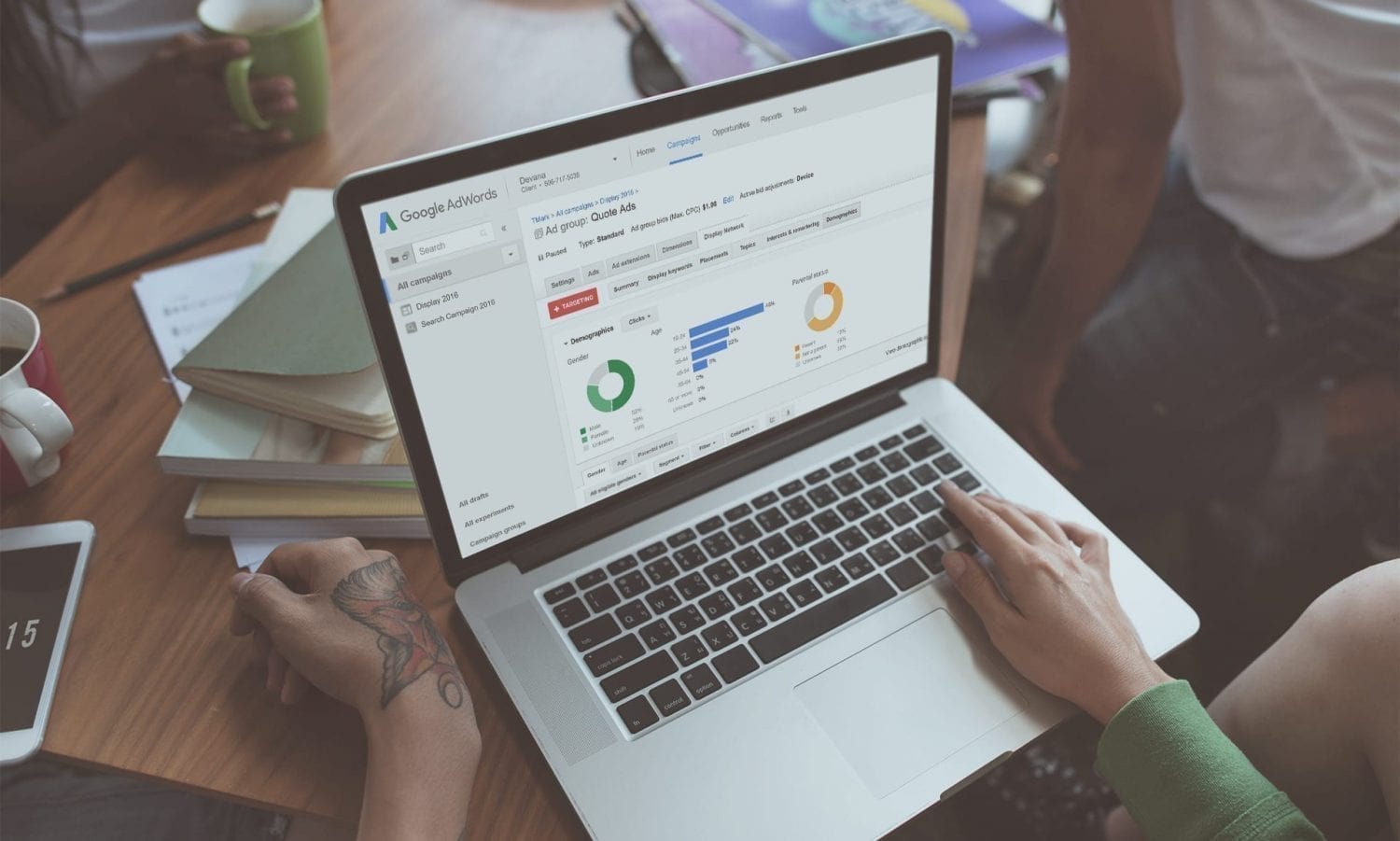So you’re thinking about entering the world of pay-per-click (PPC) marketing. You’ve talked to friends, fellow vacation rental professionals, and maybe even some marketers, but you’re still not sold. “Do people really click on paid Internet ads?” you may ask. “Will it really be worth the time and money?” Those are typical questions to ask before you enter the vast and confusing world of paid search marketing.
What is PPC?
 In a nutshell, PPC marketing is exactly what its acronym stands for: pay-per-click marketing. You put ads on the Internet and pay each time an ad generates a click. The most common PPC platform is Google AdWords, consisting of both the Google Search Network, where you serve ads to people searching for your keywords on Google, and the Google Display Network, which is a network of millions of websites that allows you to serve ads to users as they navigate the rest of the Web and that is commonly used for remarketing. In addition to Google, PPC also includes Bing Ads, Facebook ads, Instagram ads, and more.
In a nutshell, PPC marketing is exactly what its acronym stands for: pay-per-click marketing. You put ads on the Internet and pay each time an ad generates a click. The most common PPC platform is Google AdWords, consisting of both the Google Search Network, where you serve ads to people searching for your keywords on Google, and the Google Display Network, which is a network of millions of websites that allows you to serve ads to users as they navigate the rest of the Web and that is commonly used for remarketing. In addition to Google, PPC also includes Bing Ads, Facebook ads, Instagram ads, and more.
There is no denying that PPC is becoming more popular. Google now devotes the top four spots in its search results to ads. With 75 percent of Google’s revenue coming from ads (and AdWords in particular), it has a huge incentive to continue to improve its platform and place the right ads in front of the right people.
Benefits
PPC marketing can be your best friend or your worst enemy, depending on how you approach it. If done correctly (i.e., if it’s done by people who know what they’re doing), the list of benefits can be long:
- Immediate Results: The beauty of PPC is that you know exactly what you’re getting for your money—and you know it immediately. You know the number of clicks, leads, bookings, and calls, and you know the average time on site, bounce rate, and more. It’s all set out in front of you.
- Flexible Budget: Another benefit of PPC is that your budget can be flexible on a daily, weekly, and monthly basis. If things are working well, there’s almost always room to increase spending and increase bookings in return; and if things are slow, you can temporarily spend less and focus on your top-performing campaigns.
- Increased Brand Awareness: Even if you don’t generate a click, you enjoy free branding for your company because your ads will be seen by relevant searchers.
- Rewards for Being a Good Site: As I mentioned earlier, Google has a huge incentive to place the right ads in front of the right people. As a result, if you can establish yourself as a “quality” ad in Google’s eyes, then you will decrease your cost per click and make your ads more efficient.
- Protecting Your Brand: If users search for your brand on Google, it is beneficial to show them an ad before your organic results. One reason is because it assures searchers that your brand is legitimate while eliminating any chance of a competitor jumping your organic result with one of its ads and potentially stealing your business.
- Increasing Pressure on Competitors: In contrast, if some of your competitors aren’t bidding on their branded keywords, you can attempt to jump their organic results and “steal” their clicks. Competitor campaigns have proven to be successful in generating cost-efficient bookings.
- Increasing Inventory: That’s right—PPC isn’t merely for increasing bookings. You can also target homeowners looking to add their homes to the rental pool, thus strengthening your business for the long term.
- Knowing Your ROI: With all the data you collect from each click, it’s easy to determine how much money PPC has brought in. It has been said, “You have to spend money to make money.” With PPC, you know exactly how much you spend and exactly how much you make.
Who’s It For?
With all those benefits, PPC must be for everyone, right? Wrong. There are many factors to consider when determining if PPC is right for you, and as noted earlier, it’s not for everyone. Here are five key points to consider:
- Do you have enough inventory? Do you typically sell out without the help of PPC marketing? If so, then it may be difficult to generate a positive ROI with such limited inventory. Instead, it may make sense to begin with a property management campaign to acquire new homeowners.
- Does your location receive enough traffic? PPC succeeds when people are searching for your specific product. If not enough people are searching, it becomes tough to get your ads in front of the right potential customers. But for most vacation destinations, this isn’t a problem.
- Are you investing in other marketing strategies? PPC works best when paired with other digital marketing strategies. You will need a solid SEO plan as well as an optimized website that’s set up for success.
- Are you willing to spend money to make money? There’s no way around the fact that PPC requires a budget. If you’re strapped for cash, then the PPC investment may be too big of a pill to swallow.
- Do you trust your PPC manager? All of the aforementioned becomes moot if the person managing the PPC account isn’t an expert. PPC is a competitive game, and if the person managing the account isn’t adept at the intricacies involved, it becomes easy to waste a lot of money—and fast.
Keys to Success
Still interested? Want to know exactly what it takes to build a successful PPC campaign? When it comes down to it, there are three distinct phases of creating and maintaining a well-run PPC account: the build-out, ongoing management and optimizations, and reporting.
The build-out of the account is the first step when starting/reworking a PPC account. The process starts with using any existing data and keyword research to create a list of keywords that you think will put your ads in front of the right eyes. From there, it all comes down to one word: organization. You want to organize your keywords into appropriate ad groups and campaigns so you know exactly where to find each keyword. A best practice is to organize campaigns by locations people may search for and organize ad groups within those campaigns by key features of the properties in question. For example, if someone were to google “Mission Beach San Diego beachfront home rentals,” I’d know the ad is coming from the “Mission Beach” campaign in the “Beachfront Homes” ad group.
There are many reasons proper organization is important to the initial build. For one, it allows you to tailor your ad copy specifically to what individual users are searching for. You can customize location (because you know exactly what location they are searching for), and you also can customize specific wording in the ad and what landing pages users are sent to based on the more specific details included in their searches. In addition, proper organization will make optimization of the account much easier moving forward. You will know exactly how “beachfront” searches perform in comparison to “ocean view,” and it will be easy to allocate budget based on that information.
Other important parts of the initial building phase include making sure your conversions are being tracked properly, that you’re utilizing as many ad extensions as possible, that your remarketing lists and remarketing campaigns are set up correctly, and that your ads look professional and, therefore, will result in clicks.
Once the initial build is approved and running, the next step is the ongoing management and optimization of the account. The goal is to have the account running like a fine-tuned, well-oiled machine. With all the pieces in their correct places and conversion tracking working correctly, accurate data will begin to funnel in immediately. After you’ve compiled enough data you can begin to act based on those results. You can adjust bids so that you’re spending more for top-performing keywords and less on the ones that are lagging; you can add negative keywords to the account to ensure that you’re eliminating as much wasted spend as possible; you can adjust ad copy so that you’re focusing on the messaging that resonates most with searchers; you can make time-of-day and day-of-week bid adjustments so that you’re bidding most when users are most likely to book and bidding less during down times; and you can adjust bids on devices, ensuring that mobile performance is being maximized as opposed to being grouped with desktop. There are unlimited ways to optimize an account, which is why ongoing management is so important for success.
The last step in a creating successful PPC campaign is accurate, reliable reporting. By reporting on your results on a weekly or bi-weekly basis, you can better understand how the account is performing and spot any trends. It also makes it easier to pinpoint any issues with the account. By laying out the data in a consistent, easy-to-understand way, you can see if the account is headed in the right direction. The following are the best ways to set up campaign reporting:
- Dynamic Call Tracking: The phone number will pivot based on the origin of the user. This is critical for tracking inbound calls. Simply run a report and pair the phone numbers with guest reservation folios.
- CallRail.com
- Calltrackingmetrics.com
- NAVIS
- Google Analytics Ecommerce: Echoing values into Google Analytics is critical to determine true ROI via online booking. It’s best to organize values by room rent/taxes/fees—all by order IDs. Then you can take total room rent minus management fee percentage and PPC expenses for ROI.
- Generic Goals: A few things you might consider creating include total reservations, property inquiries, “Contact Us” page form fills, and “Property Management” page form fills (assuming you want more inventory).
Conclusion
The choice of whether to enter the PPC world is yours. For some, it’s a huge boon to their business, helping to sell out during busy periods and increase bookings during slower periods. Some of our biggest property managers spend upward of $500,000 on PPC ads yearly, bringing in thousands of bookings and millions more in revenue. Others spend as little as $1,000 per month, yet they still receive a boost in bookings and dozens of monthly property management leads.
As long as you keep your expectations in check and the account is properly managed, PPC can be one of the best ways to generate additional bookings and improve your company’s bottom line.


